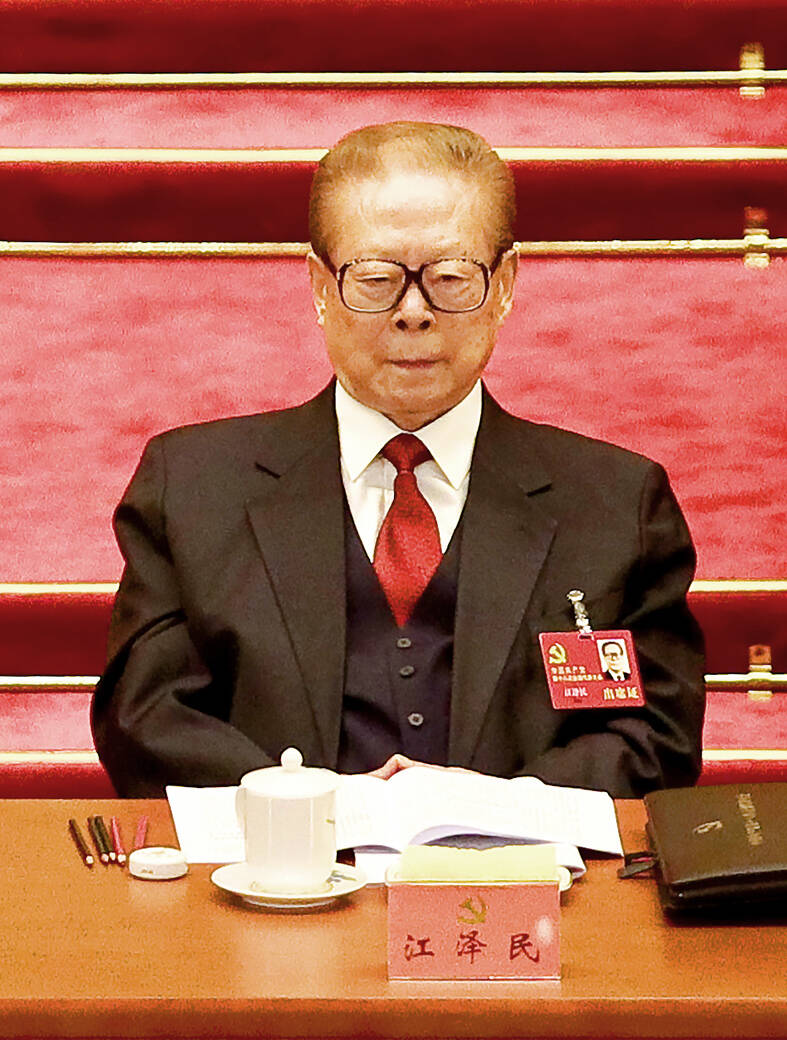Former Chinese leader Jiang Zemin (江澤民) died yesterday, state media reported, hailing him as a great communist revolutionary who helped quell democracy protests in 1989.
He was 96.
Jiang took power in the aftermath of the Tiananmen Square Massacre, in which the military used deadly force to end demonstrations and led China toward its emergence as a global economic powerhouse.

Photo: EPA-EFE
The major bodies of the Chinese Communist Party (CCP) announced his death through a letter that expressed “profound grief.”
“Jiang Zemin passed away due to leukemia and multiple organ failure in Shanghai at 12:13pm on Nov. 30, 2022, at the age of 96, it was announced on Wednesday,” Xinhua news agency said.
His death came after all medical treatments had failed, it added, citing the letter.
“Comrade Jiang Zemin was an outstanding leader ... a great Marxist, a great proletarian revolutionary, statesman, military strategist and diplomat, a long-tested communist fighter, and an outstanding leader of the great cause of socialism with Chinese characteristics,” it said.
Jiang’s death comes amid a flare-up of protests against COVID-19 lockdowns that have morphed into calls for more political freedoms — the most widespread since the 1989 rallies.
When Jiang replaced Deng Xiaoping (鄧小平) in 1989, China was still in the early stages of economic modernization. By the time he retired as leader in 2003, China was a member of the WTO, Beijing had secured the 2008 Olympics and the country was well on its way to superpower status.
Analysts say Jiang and his “Shanghai Gang” faction continued to exert influence over Chinese politics long after he left the top job, including in the selection of Xi Jinping (習近平) as president in 2012.
CCTV said that flags would be flown at half-mast at Chinese government buildings until his funeral, for which a date is not set.

TRAGEDY STRIKES TAIPEI: The suspect died after falling off a building after he threw smoke grenades into Taipei Main Station and went on a killing spree in Zhongshan A 27-year-old suspect allegedly threw smoke grenades in Taipei Main Station and then proceeded to Zhongshan MRT Station in a random killing spree that resulted in the death of the suspect and two other civilians, and seven injured, including one in critical condition, as of press time last night. The suspect, identified as a man surnamed Chang Wen (張文), allegedly began the attack at Taipei Main Station, the Taipei Fire Department said, adding that it received a report at 5:24pm that smoke grenades had been thrown in the station. One man in his 50s was rushed to hospital after a cardiac arrest

SAFETY FIRST: Double the number of police were deployed at the Taipei Marathon, while other cities released plans to bolster public event safety Authorities across Taiwan have stepped up security measures ahead of Christmas and New Year events, following a knife and smoke bomb attack in Taipei on Friday that left four people dead and 11 injured. In a bid to prevent potential copycat incidents, police deployments have been expanded for large gatherings, transport hubs, and other crowded public spaces, according to official statements from police and city authorities. Taipei Mayor Chiang Wan-an (蔣萬安) said the city has “comprehensively raised security readiness” in crowded areas, increased police deployments with armed officers, and intensified patrols during weekends and nighttime hours. For large-scale events, security checkpoints and explosives

PUBLIC SAFETY: The premier said that security would be tightened in transport hubs, while President Lai commended the public for their bravery The government is to deploy more police, including rapid response units, in crowded public areas to ensure a swift response to any threats, President William Lai (賴清德) said yesterday after a knife attack killed three people and injured 11 in Taipei the previous day. Lai made the remarks following a briefing by the National Police Agency on the progress of the investigation, saying that the attack underscored the importance of cooperation in public security between the central and local governments. The attack unfolded in the early evening on Friday around Taipei Main Station’s M7 exit and later near the Taipei MRT’s Zhongshan

A car bomb killed a senior Russian general in southern Moscow yesterday morning, the latest high-profile army figure to be blown up in a blast that came just hours after Russian and Ukrainian delegates held separate talks in Miami on a plan to end the war. Kyiv has not commented on the incident, but Russian investigators said they were probing whether the blast was “linked” to “Ukrainian special forces.” The attack was similar to other assassinations of generals and pro-war figures that have either been claimed, or are widely believed to have been orchestrated, by Ukraine. Russian Lieutenant General Fanil Sarvarov, 56, head